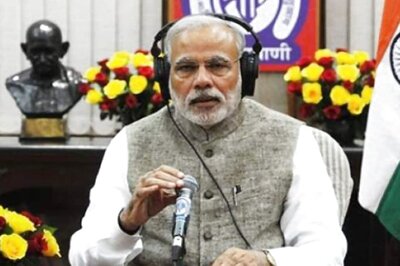
views
New Delhi: The Ministries of Agriculture & Farmers Welfare, and of Fisheries, Animal Husbandry & Dairying jointly released diagnostic kits which can prevent the spread of Japanese Encephalitis and the Bluetongue virus in animals and thus predict their outbreak in humans under the ‘Make in India’ initiative on Tuesday.
The Bluetongue sandwich ELISA and the Japanese Encephalitis 1gM ELISA kits have been developed jointly by the Indian Council of Agricultural Research (ICAR) and the Indian Veterinary Research Institute (IVRI).
“This indigenous technology will not just help save foreign exchange as the newly developed kits cost ten times lesser than the imported ones but also has the potential to earn foreign exchange,” a release from the ministry said.
Speaking at the launch event at Krishi Bhawan in Delhi, Dr T Mohapatra, secretary Department of Agricultural Research and Education (DARE) and director general of ICAR said that the Encephalitis kit is significant given the “re-emergence of the JE viral zoonotic disease” which leads to death of children every year in the country.
The commercial kit currently available in the market for JE detection costs Rs 52,000, whereas the ICAR and IVRI developed the same for farmers at a minimal price of Rs 5000 only. Each kit is meant for testing around 45 samples, the director general stated.
“India imports one diagnostic kit for this virus at Rs 1200-1500. But, now we have developed this kit for just Rs 180-200,” he added, stressing on the cost effectiveness achieved by indigenous innovation.
Earlier this year, an outbreak of acute encephalitis syndrome (AES) led to the death of more than 100 children in Bihar’s Muzaffarpur. This outbreak returns annually in parts of northern India. The state of UP, however, has been successful in reducing the outbreak of the disease with the DASTAK campaign against communicative diseases.
In 2016, AES affected 3911 children in UP of which 641 died. The following year 655 children died. The toll reduced to 30 deaths in 2018 due to the state government’s committed intervention.
The development of the JE kit is part of the premium research institutes 100-day program. According to Mohapatra, the kit will soon be made available at the village and block levels.
Mohapatra also highlighted key features of the Bluetongue kit which was developed for the detection for antigen in animals. The disease, widespread among sheep, goats, cattle, buffaloes and camels in the country, occurs due to the insect-transmitted Bluetongue virus.
“With the help of the Kit, the Bluetongue Virus can be controlled with the vaccination of susceptible animals, vector control and quarantine of infected animals with the good management practices. Apart from the vaccination, early diagnosis and isolation of infected animals are some of the commonly suggested preventive methods for controlling the spreading of the disease,” the release from the department of animal husbandry stated.
Mohaptra, who is also the secretary of the department of agriculture research and education, proudly also announced the export possibilities of the Blutongue kit. “India is the first country in the world to develop a diagnostic for BT virus,” he said.
Also present at the launch of the kits were Atul Chaturvedi, secretary department of animal husbandry and dairying, Sushil Kumar, additional secretary DARE and secretary ICAR and RK Singh, director, IVRI.
Chaturvedi lauded the development of the kits and said that they will be “beneficial not just for the farming community, but for the whole society”.




















Comments
0 comment